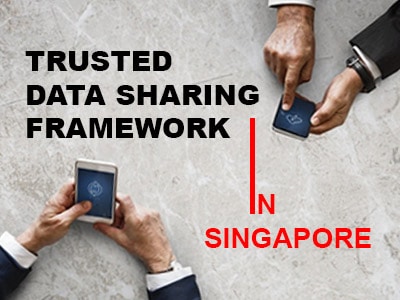Trusted Data Sharing Framework Announced in Singapore
 New Guidelines for Trusted Data Sharing Among Businesses
New Guidelines for Trusted Data Sharing Among Businesses
Singapore has announced the first comprehensive Trusted Data Sharing Framework to help facilitate data sharing between organisations.
The framework was developed by the Infocomm Media Development Authority (IMDA) and the Personal Data Protection Commission (PDPC). It established a set of baseline practices that organisations can refer to, in addition to providing a common “data-sharing language”. The framework also proposed a systematic approach to establish trust between partners involved in the sharing.
The framework is intended to provide businesses with a guide to adopting a more responsible approach to data sharing. This will enable businesses to access the information they need, while creating better products and services, and minimise business costs. In short, the Trusted Data Sharing Framework outlines the best practices for companies to comply with.
The Trusted Data Sharing Framework is intended to provide greater clarity regarding regulatory compliance. With the stronger safeguards and security in place, consumers will enjoy greater peace of mind and be more willing to share their data. This is a win-win situation as this will lead to more personalised goods and services for the consumer.
Besides personalisation, consumers can expect additional benefits from this framework as well. When data sharing occurs between telecommunications providers (telcos) for instance, customers will no longer need to manually fill their data. Even if they decide to change to another telco provider, their details are ready to be retrieved. Inter-sectoral exchanges can take place with banks and telcos exchanging customer data information to better tailor products and services.
Challenges Address by Trusted Data Sharing Framework
The Trusted Data Sharing Framework will address several challenges that organisations currently have to deal with in terms of data sharing. These challenges include inadequate guidance, concerns over misuse and concerns over a potential loss in business competitiveness.
The framework will facilitate and support businesses in their adoption and development of Artificial Intelligence (AI) and data projects. This will lead to the creation of new value for businesses themselves, partners and/or customers alike. Fears and concerns over AI primarily stem from the outcome of how the data will be applied once collected and processed.
Trust needs to be established so AI solutions can better transform Singapore through technology. Data sharing is necessary for product development, service delivery and new business models. AI technology is already here and needs the right regulatory mix. That is what the Trusted Data Sharing Framework aims to accomplish.
Establishing a trustworthy regime on data sharing is the key that will enable Singapore to realise its full potential as a Digital Economy. Singapore’s Digital Economy Framework for Action estimates a further contribution of US$10 billion by 2021 to GDP. Singapore cannot maximise the benefits of being a Smart Nation without shared data flow.







